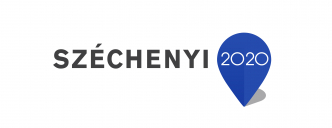What was New in Organic Agriculture in 2022?
Hungarian Research Institute of Organic Agriculture Annual Assessment
2022 was full of extra challenges for Hungarian agriculture as a whole. However, the difficulties again show that in a rapidly changing world, future-proof agroecological production methods are extremely valuable, and provide a reliable reference point. More EU and domestic resources than ever before have been made available to Hungarian farmers for organic production and transition, and the Hungarian Organic Action Plan, which came into effect in 2022, is encouraging further development in the sector. The Research Institute of Organic Agriculture (ÖMKi) is strengthening domestic knowledge transfer and the sustainability revolution through its wide-ranging and expanding research, as well as its growing role in EU projects.
Climate change, the destruction of natural habitats, soil degradation, the COVID pandemic… These challenges, which have been with us for years, were further aggravated in 2022 by the war in Ukraine, and the energy crisis unfolding around us. These circumstances demonstrate more strongly than ever the importance of a secure food supply – that is, the strategic role of locally produced, sustainable, healthy and accessible food. Trends increasingly point away from an agricultural model based on chemical plant protection agents and fertilizers, and towards production using agroecological methods. In 2022, these trends were further strengthened and accelerated by the agricultural support system. The proportion of land under agricultural cultivation has increased dynamically in recent years, reaching 6.12% in 2020. As part of the five-year organic support program launched in 2022, subsidies were granted to nearly 3,500 farmers with a total of more than 150,000 hectares of land. At the same time, the exponential increase in the price of chemical pesticides and synthetic fertilizers is also encouraging farmers to look for alternative solutions. In light of all this, not to mention a growing awareness of consumer demand, scientific research in support of organic farming is receiving more attention every year.
Hungarian organic farming is developing according to a new action plan
A Ministry of Agriculture paper called the National Action Plan for the Development of Organic Farming (ÖCST), published at the beginning of 2022, outlines the development directions of the sector for the 2022–2027 period. Ten years of research at ÖMKi, as well as Hungarian and international organic farming experience, played a role in the preparation of the document. In May, at the now traditional Organic Farming Sector Day, the agricultural profession reviewed the current trends and challenges for organic farming in Hungary, with a particular focus on this strategic document. At the meeting, experts repeatedly highlighted the fact that organic farming is a highly knowledge-intensive form of agricultural production, meaning that training, consultation and innovation systems will have a particularly important role in the future, for which the Ministry of Agriculture is providing more EU and domestic resources than ever before, within the framework of the Common Agricultural Policy.
Lessons learned from the Russian-Ukrainian conflict
In 2022, for the tenth time, ÖMKi organized the East-Central Europe section at the world's leading organic fair, BIOFACH, and represented Hungary at the world’s largest organic-agriculture-themed gathering. As part of the event, high-level political representatives discussed the current state of organic agriculture in Central and Eastern European countries. Climate change was the main theme of the 33rd BIOFACH International Organic Food and Organic Goods Trade Fair held in Nuremberg, and at the forum organized by ÖMKi, experts primarily discussed how the war is affecting the agricultural policy of the East-Central European region. The starting point for deliberations in this section was the EU's Organic Action Plan, which sets ambitious goals, such as ensuring that 25% of land is under organic cultivation by 2030.
As a result of the war in Ukraine, the organic sector was of course also significantly affected by the energy crisis, with significant increases in fuel and gas prices. Despite these difficulties, the current crisis may in fact strengthen the development of organic farming, since the level of resilience in that sector is much greater than that of farming based on chemical input materials. The organic production method is less dependent on external factors such as rising prices for fertilizer and chemical pesticides, and due to shorter supply chains, it is less exposed to the hectic ups and downs of the global market.
The organizers of the professional forum and BIOFACH agreed that the loosening of environmental protection and sustainability regulations is not the right approach to solving crop loss caused by climate change, or the challenges to the global food supply caused by conflicts, and called on decision-makers to keep sustainability goals in mind, since they remain vitally important in both war and peace. The extraordinary drought damage of 2022 also shows that the need to increase the flexible resilience and sustainability of agriculture is greater than ever.
International involvement and advocacy of Hungarian interests
Aware of international trends and following best domestic practices, the experts at ÖMKi spent 2022 working to create a future-proof model of agriculture, in which sustainability and competitiveness go hand in hand.
Referring to ÖMKi’s role, Dr Dóra Drexler, the director of ÖMKi, and vice president of IFOAM Organics Europe, said the following: ‘The importance of our research institute in the EU's most important strategic projects is constantly increasing. As well as representing Hungary's interests, we are contributing to the successful implementation of the Soil Mission and to preparations for the European Agroecological Partnership, and at the regional level we are representing domestic agroecological research trends in BIOEAST. Quite a few of our activities, which we launched on a small scale ten years ago, have reached a level in 2022 at which they can even be said to occupy a key position in European-level strategies. ÖMKi's participatory On-Farm Research Network is one such example of this. With the involvement of the European Union, we have both insight and a voice in helping to determine the future directions of agricultural research and development, and we can represent domestic interests. Through our involvement, we can also offer Hungarian farmers, fellow researchers and those involved in politics the opportunity to engage directly, through their work and their experiences, with processes that are going on at the European level.’
ÖMKi will continue this work in 2023, promoting the development of organic farming and organic product paths through practice-based research and development and knowledge transfer, both at the Hungarian and at the EU level.
Dr Dóra Drexler added the following: ‘Starting next year, we expect that thanks to new studies, alongside our ongoing research, we will be able to provide a better insight into domestic organic production and the economic implications of the organic transition, including from an agricultural economy perspective. Our goal is to strengthen organic consulting and expand the range of practical training materials that we can use to support farmers and hobby gardeners who choose to go organic.’
Milestones of 2022 in Hungarian organic research
The ÖMKi On-Farm Network, which has been conducting experiments in collaboration with hundreds of farmers since 2012, celebrated its tenth anniversary. The aim of our on-farm research is to achieve practical results that are useful in everyday farming, and to carry out research that connects Hungary with the international scientific life, while supporting the development of product paths, and encouraging local economic actors such as producers, processors and consultants to take an active part in innovation. Based on participatory research, and through the so-called Living Laboratory method, we now have a decade’s worth of practical research results that provide answers to problems that farmers face, thus increasing their competitiveness, as well as improving sustainability.
After two years of research work, 2022 saw the publication of the latest results from ÖMKi’s national, small-plot cereal crop experiments, which can further increase the share of domestic, organically cultivated cereals under cultivation, as well enabling products made from organic flour to be baked in local bakeries and served on consumers’ tables. As part of the research, domestic and international spring wheat and spelt varieties which appeared promising from the point of view of organic farming were tested in small-plot field experiments under organic farming conditions, at seven locations nationwide, using more than 20 different varieties in total. In the autumn of 2022, the crops were sown for the third year of the ÖMKi-VSZT-Nébih small-plot post-registration variety test network.
The rise of landrace organic products: ÖMKi's organic tomato seedlings are becoming more and more popular among home growers of landrace varieties, with a record 26,000 plants sold nationwide in 2022.
Through the retail sale of seedlings, researchers can draw attention to sustainable agriculture and the importance of organic farming, since by consuming and producing domestic organic products, we are not only improving our health, but also doing the environment good.
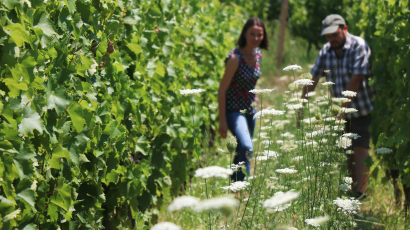
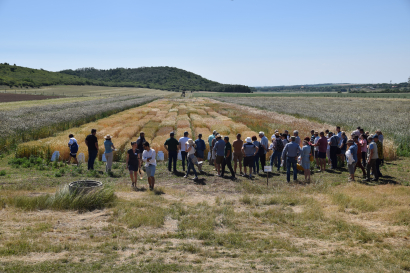
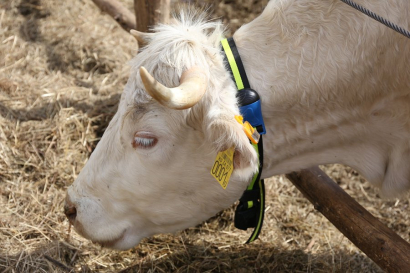
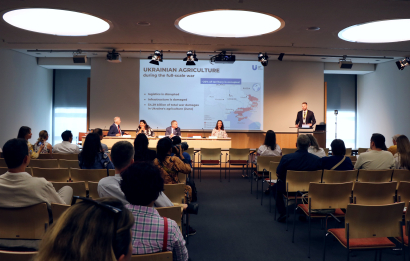
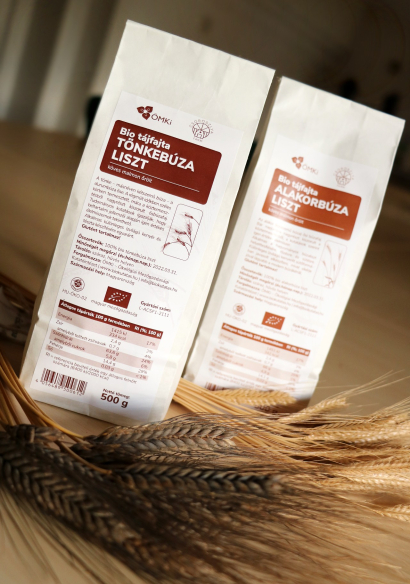
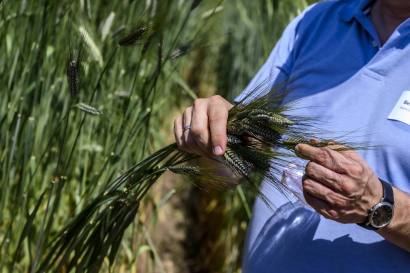
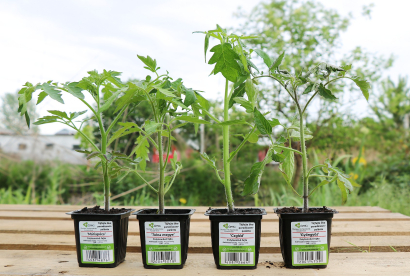
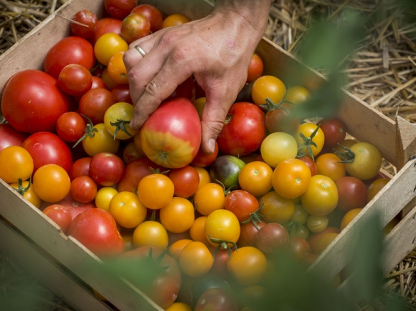
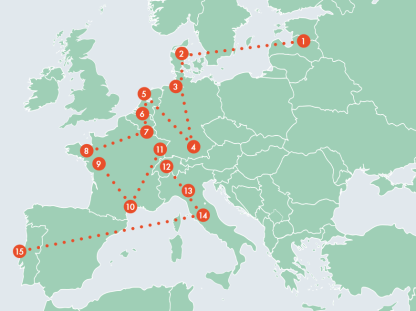
.jpg)


